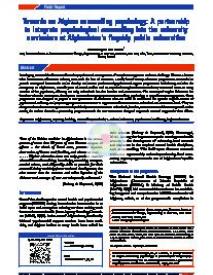Towards an Afghan counselling psychology : A partnership to integrate psychological counselling into the university curriculum at Afghanistan’s flagship public universities
Developing sustainable efforts to address the psychosocial consequences of complex emergencies is often a challenge. There is a limit to what humanitarian efforts can achieve, even with the best of intentions. Locally based tertiary education programmes are needed to provide conceptual frameworks and to develop and sustain professional psychosocial support programmes both during and after the emergency. In Afghanistan, over 30 years of armed conflict and its sequelae have placed an extraordinary emotional strain on every member of the population, affecting not only individuals but also families and communities.
The Ministry of Higher Education has therefore taken the initiative to develop two new academic programmes in counselling psychology in its public university system. These programmes are designed to prepare a new generation of academics who can come to understand the specific Afghan context of psychosocial suffering and prepare appropriate interventions to support transformation on an individual and communal level. They are also poised to educate a new generation of qualified practitioners to serve individuals, families, communities and the society itself. In this article, the authors describe a partnership programme with the two universities designed to provide external support for their efforts.
In: Intervention: Journal of Mental Health and Psychosocial Support in Conflict Affected Areas, ISSN 1571-8883 | 16 | 3 | 261-268
http://doi.org/10.4103/INTV.INTV_57_18


